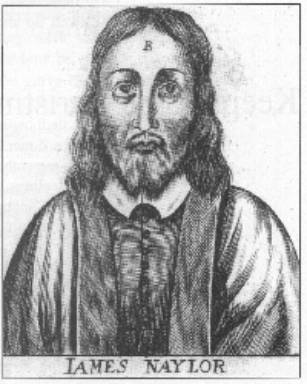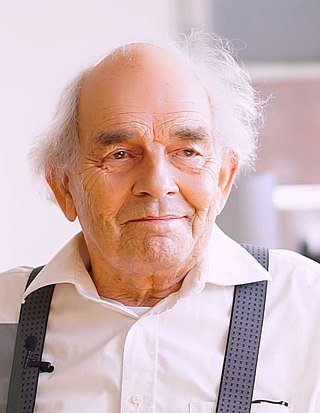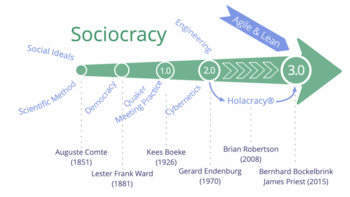
George Fox was an English Dissenter, who was a founder of the Religious Society of Friends, commonly known as the Quakers or Friends. The son of a Leicestershire weaver, he lived in times of social upheaval and war. He rebelled against the religious and political authorities by proposing an unusual, uncompromising approach to the Christian faith. He travelled throughout Britain as a dissenting preacher, performed hundreds of healings, and was often persecuted by the disapproving authorities.

Consensus decision-making or consensus process is a group decision-making process in which participants develop and decide on proposals with the goal of achieving broad acceptance, defined by its terms as form of consensus. The focus on establishing agreement of at least the majority or the supermajority and avoiding unproductive opinion differentiates consensus from unanimity, which requires all participants to support a decision. Consensus decision-making in a democracy is consensus democracy.
Friends United Meeting (FUM) is an association of twenty-six yearly meetings of the Religious Society of Friends (Quakers) in North America, Africa, and the Caribbean. Its home pages states that it is "a collection of Christ-centered Quakers, embracing 34 yearly meetings and associations, thousands of local gatherings and hundreds of thousands of individuals". In addition there are several individual monthly meetings and organizations that are members of FUM; FUM's headquarters is in Richmond, Indiana, with offices in Kisumu, Kenya. Friends United Meeting is a member of the National Council of Churches in the United States of America.

James Nayler was an English Quaker leader. He was among the members of the Valiant Sixty, a group of early Quaker preachers and missionaries. In 1656, Nayler achieved national notoriety when he re-enacted Christ's Palm Sunday entry into Jerusalem by entering Bristol on a horse. He was imprisoned and charged with blasphemy.
The views of Quakers around the world towards homosexuality encompass a range from complete celebration and the practice of same-sex marriage, to the view that homosexuality is sinfully deviant and contrary to God's intentions for sexual expression. The Religious Society of Friends (Quakers) is a historically Christian religious movement founded in 17th-century England; it has around 350,000 members. In Britain, Canada, New Zealand and Australia, many Quakers are supportive of homosexual relationships, while views are divided among U.S. meetings. Some Conservative Friends and Holiness Friends, both of which have retained traditional Quaker practices such as plain dress, along with Evangelical Friends, view homosexual acts as sinful. The majority (52%) of Quakers live in Africa, and though views may differ, the Kenyan Church of Friends does not support homosexual relationships.

Inward light, Light of God, Light of Christ, Christ within, That of God, Spirit of God within us, Light within, and inner light are related phrases commonly used within the Religious Society of Friends (Quakers) as metaphors for Christ's light shining on or in them. It was propagated by the founder of the Quaker movement, George Fox, who "preached faith in and reliance on 'inward light' ". The first Quakers were known to sit in silence and meditate on the words of the Bible until they felt the inward light of God shining upon them and the Holy Spirit speaking. The concept was highly important to early Quakers, who taught: "God reveals Himself within each individual's conscience and consciousness by the Holy Spirit, Christ Himself being the Light to illuminate man's sinfulness and lead in the way of truth and righteousness. ... this light is in all men by the grace of God to lead them to Christ, and that the same light will give daily guidance to the Christian."

Quaker weddings are the traditional ceremony of marriage within the Religious Society of Friends. Quaker weddings are conducted in a similar fashion to regular Quaker meetings for worship, primarily in silence and without an officiant or a rigid program of events, and therefore differ greatly from traditional Western weddings. In some respects a Quaker marriage resembles a common-law marriage.
The Philadelphia Yearly Meeting of the Religious Society of Friends, or simply the Philadelphia Yearly Meeting, or PYM, is the central organizing body for Quaker meetings in the Philadelphia, Pennsylvania, United States area, including parts of Pennsylvania, Maryland, Delaware and New Jersey.

A testimony of equality is an act, usage, or course of conduct by a member of the Religious Society of Friends (Quakers) tending to assert or promote equality of persons, arising from the Friends' belief that all people are equal in the eyes of God. The word testimony describes the way that Friends testify or bear witness to their beliefs in their everyday life. A testimony is therefore not a belief, but is committed action arising out of Friends' religious experience. Testimony of equality has included Quakers' participating in actions that promote the equality of the sexes and races, as well as other classifications of people.

Yearly Meeting is an organization composed of constituent meetings or churches of the Religious Society of Friends, or Quakers, within a geographical area. The constituent meetings are called Monthly Meetings in most of the world; in England, local congregations are now called Area Meetings, in Australia Monthly Meetings are called Regional Meetings. "Monthly" and "Yearly" refer to how often the body meets to make decisions. Monthly Meetings may be local congregations that hold regular Meetings for Worship, or may comprise a number of Worship Groups. Depending on the Yearly Meeting organization, there may also be Quarterly Meetings, Half-Yearly Meetings, or Regional Meetings, where a number of local Monthly Meetings come together within a Yearly Meeting.

Within the Religious Society of Friends, a clerk is someone responsible for various administrative functions within a meeting for worship for church affairs or meeting for worship with attention to business. The clerk is responsible for recording the discernment which is arrived at during such a meeting, in a minute, and is responsible for sending and receiving correspondence on behalf of the meeting. Within some branches of the Religious Society of Friends, the clerk may also create an agenda and may facilitate the meeting.
In parliamentary procedure, unanimous consent, also known as general consent, or in the case of the parliaments under the Westminster system, leave of the house, is a situation in which no member present objects to a proposal.
In the Religious Society of Friends (Quakers), a monthly meeting or area meeting is the basic governing body, a congregation which holds regular meetings for business for Quakers in a given area. The monthly meeting is responsible for the administration of its congregants, including membership and marriages, and for the meeting's property. A monthly meeting can be a grouping of multiple smaller meetings, usually called preparative meetings, coming together for administrative purposes, while for others it is a single institution. In most countries, multiple monthly meetings form a quarterly meeting, which in turn form yearly meetings. Programmed Quakers may refer to their congregation as a church.
Sociocracy is a theory of governance that seeks to create psychologically safe environments and productive organizations. It draws on the use of consent, rather than majority voting, in discussion and decision-making by people who have a shared goal or work process.
Conservative Friends are members of a certain branch of the Religious Society of Friends (Quakers). In the United States of America, Conservative Friends belong to three Yearly Meetings, Ohio, North Carolina, and Iowa. English Friends affiliated with the Conservative branch tend to use the term Primitive, or Plain. There is no single unifying association of Conservative Friends, unlike three of the other branches of Quakerism in America, represented by Friends United Meeting, Evangelical Friends International, and Friends General Conference.
A meeting for worship is what the Religious Society of Friends call their church service. Different branches of Friends have different types of meetings for worship. A meeting for worship in English-speaking countries typically lasts an hour.

Quakers are people who belong to the Religious Society of Friends, a historically Protestant Christian set of denominations. Members of these movements are generally united by a belief in each human's ability to experience the light within or "answering that of God in every one". Some profess a priesthood of all believers inspired by the First Epistle of Peter. They include those with evangelical, holiness, liberal, and traditional Quaker understandings of Christianity. There are also Nontheist Quakers, whose spiritual practice does not rely on the existence of God. To differing extents, the Friends avoid creeds and hierarchical structures. In 2017, there were an estimated 377,557 adult Quakers, 49% of them in Africa.
A Book of Discipline may refer to one of the various books issued by a Yearly Meeting of the Religious Society of Friends, setting out what it means to be a Quaker in that Yearly Meeting. The common name for this book varies from one Yearly Meeting to another and includes Book of Discipline, Faith and Practice, Christian Faith and Practice, Quaker Faith and Practice, Church Government and Handbook of Practice and Procedure. Each Book of Discipline is updated periodically by each Yearly Meeting according to the usual practice of decision making within the Religious Society of Friends.

Gerard Endenburg is a Dutch entrepreneur, who developed the Sociocratic Circle Organisation Method (SCM), which is a decision-making method for governing and managing organizations and societies based on equivalence and draws inspiration from cybernetics. Endenburg was inspired by the idea of sociocracy of Kees Boeke.

The Quakers have had a presence in Canada since 1670, when Charles Bayly was sent to be the governor of the Hudson's Bay Company. Early Quaker settlements were attempted in New Brunswick, Nova Scotia, Prince Edward Island and at Farnham in Quebec in the late 1700s. Permanent communities were realised at Adolphustown on the Bay of Quinte and at the same time at Pelham in the Niagara District before 1800. Quakers immigrated to Canada from New York, the New England States, and Pennsylvania.











